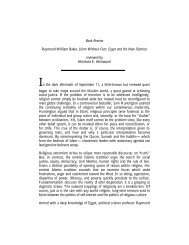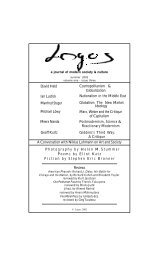Michael J. Thompson Stephen Eric Bronner Wadood Hamad - Logos
Michael J. Thompson Stephen Eric Bronner Wadood Hamad - Logos
Michael J. Thompson Stephen Eric Bronner Wadood Hamad - Logos
Create successful ePaper yourself
Turn your PDF publications into a flip-book with our unique Google optimized e-Paper software.
<strong>Michael</strong> J. <strong>Thompson</strong><br />
Look, the center right coalition in American politics today is<br />
best understood as a coalition of groups and individuals [and]<br />
the issue that brings them to politics [is that] what they want<br />
from the government is to be left alone. Taxpayers, don’t raise<br />
my taxes. Property owners, don’t restrict or limit my property.<br />
Home-schoolers, let me educate my own kids. Gun owners,<br />
don’t restrict my Second Amendment rights. All communities<br />
of faith, Evangelical Christians, conservative Catholics,<br />
Mormons, Muslims, Orthodox Jews, people want to practice<br />
their own religion and be left alone to raise their own kids. 1<br />
Known as the “leave us alone” coalition, such is the ideological context that<br />
includes the politics of the most recent tax cuts; an ideology grounded in a<br />
much broader conception of society, politics and culture; one premised on a<br />
curious mix of libertarian individualism with a provincial, parochial<br />
communitarianism. But this is merely a surface phenomenon. It appeals only<br />
to the conservative sentiments of a public that has been ideologically dragged<br />
to the right over the past two and a half decades. But the material impact of<br />
the tax cuts are typically felt at the local levels. This is, in part, a result of tax<br />
cutting policies which begin at the federal level and have trickled down over<br />
the years into the policies of states.<br />
As federal tax cuts increased throughout the 1980s and 1990s there was an<br />
increased pressure states and cities to shoulder the cost of schools and other<br />
social services. The politics of the tax cut must therefore be seen first and<br />
foremost as a broad attempt to reorient the way in which American<br />
democracy was heading since the New Deal which itself was based on the<br />
realization that the effects of capitalism on society required the intervention<br />
of the state in order to counteract the effects of what <strong>Stephen</strong> <strong>Eric</strong> <strong>Bronner</strong><br />
has called the “whip of the market” from staggering economic inequality and<br />
poverty reduction and cyclical economic crises. Later, issues ranging from<br />
pollution to enhanced social services and programs were on the minds of the<br />
public and began to enter the political agenda of the Democratic Party. It was<br />
a conception of democracy that realized that unequal economic power<br />
rendered “equal” political rights practically meaningless and that only<br />
through the fair distribution of social wealth could political and social rights<br />
truly be extended and realized.<br />
<strong>Logos</strong> 2.3 – Summer 2003




